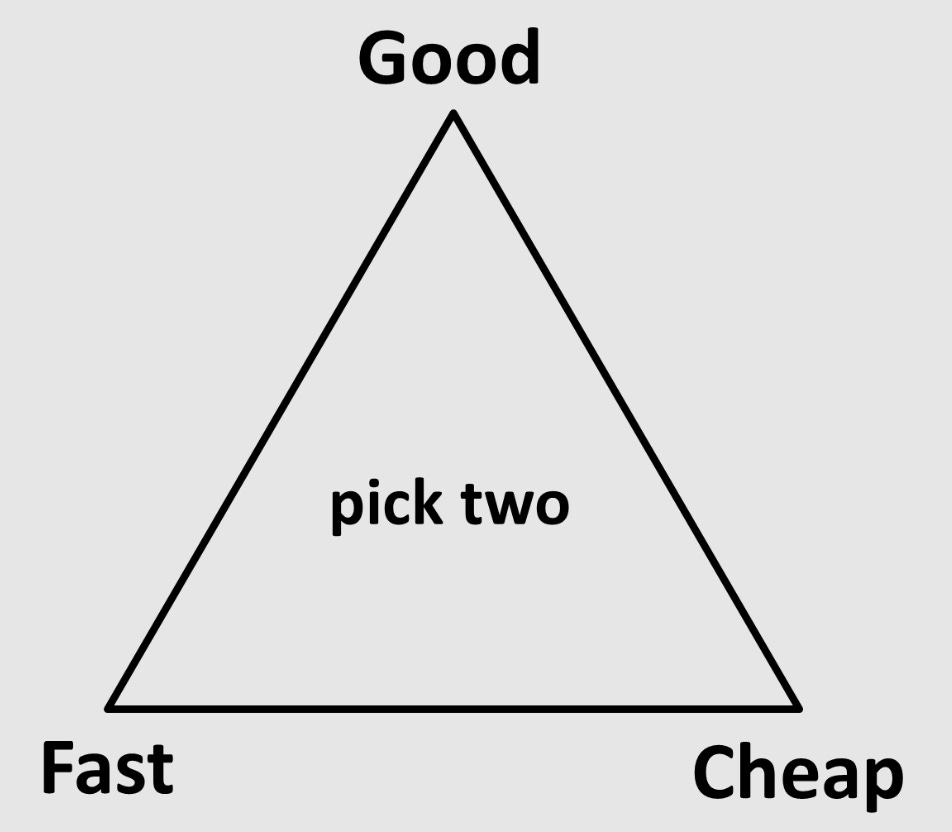There is no such thing as community, and we're all lonely
Today we talk about isolation as a consequence of labour under capitalism. Going beyond symbolic fixes can only lead us to demand more free time to go and be social.
You may or may not have heard of the triple constraint, or the "good, fast, cheap" triangle – a rule commonly referred to by engineers that explains to us that only two out of the three following things can be true at the same time: you can get the result you requested fast and cheap, cheap and good, or good and fast. If you need it good and fast, it's going to cost you. If you need it cheap and good, it's going to take time. If you want it fast and cheap, you cannot expect high quality.
This applies in a similar way to tackling the "loneliness crisis" that has recently been taken up as a topic of political attention. The same parties that have been calling for all workers to increase their working hours for nothing but the greater good, to "let go of the utopian idea that a national economy can run on a 30 hour work week", to stop being lazy, entitled millennials and stop raising lazier, even more entitled Gen Z kids and alphas, the same people who are obsessed with the idea of involuntary years of unpaid labour provided by young people to fill employment gaps in elder care and similar fields now appear to be discovering their empathetic side as advocates for public mental health.
There has been a trending debate on people's lack of social bonds and networks in recent months, and what is a trending debate if not an opportunity for political virtue-signalling. The comparison to the triple constraint comes in once we take a look at the proposed measures: if we're talking government budgets, it costs nearly nothing to raise awareness through information campaigns, to send mental health coaches to an impressive total of 100 schools, or to fund studies to establish on paper if and why people are struggling to connect with others. It is even cheaper to start book clubs or whatever else may be included in the agenda point of "increasing offers for leisure activities" – activities which will not be free of charge as there are no additional funds planned to be spent on improving people’s social lives. This concludes the German government's recently published strategy for eradicating loneliness among the populace. The proposed fixes are fast, cheap, and will ultimately be ineffectual.
Inspired by this load of hot air I’ve come across, I felt compelled to explore the following: why are these proposed solutions so predictably pointless? What can we do instead? And why are we so sad and lonely in the first place?
It’s just capitalism, bro
The neoliberals have played stupid games, and they are now paying stupid prizes. “There is no such thing as society, there are only individual people” has been the leitmotif directing our lives for so long that it is starting to come true, and extremely unsurprisingly, everybody hates it.
I would not go so far as to claim that capitalism as a whole is on the decline, but there are serious issues with the way the system has been operating that are increasingly hard to ignore. We are dealing with a capitalist problem that can only be fixed using anti-capitalist solutions. The contradictions are contradicting, and without acknowledging the issue at its core, the best thing we can say is “what if you all just.. joined a book club? We can even provide one for you!” – which is basically the same as telling a severely depressed person to simply choose happiness and smile more.
Loneliness in neoliberal culture is being treated as just another individual problem that can be solved using individual solutions - just go to the D&D group, just talk to people, just don't stay at home and doomscroll, just reach out to the friend that you don't have. Just take advantage of these wonderful leisure activities that we've set up. You don't have time? You can't afford it? That sounds like a skill issue, maybe you should be grinding harder to make it possible. They're going to start state-sponsored chess clubs, do the surprised Pikachu when nobody shows up and then explain to us afterwards that people did not show any interest in these offers, so they must not have been so lonely after all.
We cannot productively talk about loneliness without talking about our conditions of labour. Here we face a similar challenge as is found in the triple constraint triangle: we can have lonely, isolated people who bust complete ass for the sake of the economy, or we can have people with vibrant social lives who aren't working 45+ hours a week, if not multiple jobs, to be able to afford no more than a roof over their heads and a Netflix subscription.
Even those with higher than average incomes are constantly incentivised to continually try to work their way up, to achieve higher salaries, more secure positions, make themselves more and more "employable" and “indispensable to the labour market”. In a system in which we could lose everything at any time in another round of layoffs or an unfortunate case of illness, it feels irresponsible to many to deliberately not do the most, especially with recent austerity politics eating away at any remaining social safety nets we have available to us. This is how we end up with people who could theoretically afford not to still grinding their lives away like the rest of us in order to grow their insignificant investments or chase the barely attainable goal of owning their home.
The most helpful "offer for leisure activities" would simply be more leisure, but.. what is this, socialism? Take your utopian entitlement somewhere else.
Since this isn't socialism, unfortunately, there has been a prevalent idea in recent decades that any kind of fulfilment we need can and should be found in our work. If we love our jobs and identify with them more than anything else, what value is there in being off the clock?
For the perfect neoliberal subject, grinding all hours of the day away would have, in theory, been a pleasant existence. Internalise the grindset in order to enthusiastically give it our all for the GDP. Not having free time was supposed to be a non-issue with work-life blending there for us to find happiness and connection in our occupation. What had appeared to many for an optimistic few years as a new way of living in a society has turned out to be a miserable failure, a way of living in a non-society that is slowly eating up our social skills, our relationships, and our mental health.
With the proposal for increased offers in leisurely activities, it seems that there is finally a sense among policymakers – or their consultants – for the reality that the vision of the happy neoliberal subject has not exactly panned out even after adding ball pits, ping-pong tables and regular team events to the office.
In fact, we have reason to believe that the concept of work-life-blending has contributed to this growing concern of isolation.
If everything is work, nothing isn't
Having to bring parts of our private self to work by engaging in “team building” activities with coworkers and bosses, and being always connected even outside of the office, in the case of digital workers who have the cursed option for boundless flexibility, melts down the separation between work and leisure, which makes it difficult to switch one entirely off. We are never fully on task, or fully in the "free time" mindset at any given moment. It only makes sense that mindfulness coaches and exercises to teach us how to be centered in the here and now have been gaining popularity in recent years.
If everything is work, nothing isn't work - even friendships become something to manage and administer, relationships become transactional, complex human connection flattens out to become a post-it board of requests to "hold space" for someone's "trauma-dumping" or an appointment for coffee at 2:30 in the afternoon a month from now.
Seeing human relationships as yet another task, as is a consequence of the always-at-work attitude encouraged in the contemporary digital worker, can easily lead to them being perceived as tedious.
The work it takes to sustain an interpersonal connection is equated with the work required of a task done within the daily grind of labour, as opposed to being something that is, in fact, worth our time and effort for the bonding and belonging it facilitates. There is a lacking sense for self-directed free time "work", including interpersonal engagement, being separate and different from alienated wage labour. We forget that it is a particular trait of wage labour under capitalism that makes it uniquely depressing and exhausting, so we extrapolate how we feel about our jobs to everything else in our life that requires more effort than meme-scrolling.
We forget the value of friendship to the point that "cancelling plans is self-care”. Plans with other people are perceived to be just another item on the to-do list, an additional burden on our already overworked existence. So then people feel lonely and depressed and wonder why none of their few remaining friends hit them up to go climbing anymore. We miss going climbing with them, but it is just so hard, since we're constantly more or less exhausted, to get up from the couch and engage in an activity with others.
Fellow Substack blogger Luke Allen has written about the phenomenon of social relations as a bothersome agenda point in his text ”A Culture that Encourages Isolation Must be Fought to the Death". I highly suggest you read it, but for now I will leave you with the following quote:
"Ask yourself this: when you are tempted to stay home alone and force yourself out with friends, or even just in to the world, most of the time do you feel better or worse? Be honest." (x)
The implied answer here being that it is pretty much always quite nice to meet friends, to be outside, go to events, do things – "you gotta get out there". People rarely regret showing up and being social for a bit. But the more you refuse to get out there, even if you could, the more you forget about the benefits of getting out there, which leads to more time spent stewing in your depressive hedonia whilst seeing it as a sincerely preferable option to leaving the house.
Phones bad, but we’re addicted for reasons
Speaking of depressive hedonia and the meme-scrolling vortex: along with the need to sustain oneself financially as a worker in current year and the social ills fueled by the always-on fully-blended grindset mindset, people who have put a bit of thought into the topic might place the blame for our collective lack of collective on the Internet. They would not be entirely wrong, but I would claim with confidence that our pathological doomscrolling and our passive consumption of easy entertainment is just another symptom of the capitalist disease.
The following point is obviously very anecdotal, but some of you may be able to relate: whenever I am on vacation, cut completely off from my regular life and its stressors and responsibilities, temporarily freed from anything related to my full-time job, I have no desire to look at memes or see what people on Instagram are up to. When I do, out of a sense of routine, what I find behind the tiny screen is suddenly not remotely interesting to me, so I go back to demolishing 100+ pages of a book every day. When I have true free time, as opposed to the fast recharging of energy before another day of work, my phone does not exist. Only when there is true free time is there a chance to fill a significant amount of this time with activities that aren't quick and easy dopamine hits. It is true free time, completely separate from our job, that allows us to find out who we are outside of it, who our private self is, and to live the life of this private self.
We need to bring back work-life separation. But more importantly, we need more time off. True free time isn’t a few hours after work in which the next day needs to be prepared and the household taken care of, free means free from responsibilities. It isn’t the bare minimum of self and sanity maintenance required to be able to get up early and do it all again the next day. It is extended amounts of self-directed time and the financial means required to spend it on more than a Netflix binge marathon on a regular basis.
Once again I have to repeat my common take of a reduction in working hours being the most important political goal we as the working class should be fighting for. 30 hours as a standard is long overdue, though in my perfect vision of the future, we’d only be spending 20 hours on socially necessary labour in a week. Or less. As little as possible to keep things going and people’s needs served. Regardless, we have to start somewhere.
And next time your friend asks you to go climbing or knitting with them, and you can afford it, and there is no other obstacle other than not quite feeling energised and up to it enough, maybe try saying yes and going anyway.
"And I suppose the Marxist explanation would be that this is all due to late capitalism, which has overworked and atomized us. There’s certainly a lot of truth to that too, but it doesn’t mean we need to give in to it, to atomize ourselves further. Isolation can be fought. It must be fought, preferably to the death. You, as an individual, can make a choice to engage in your community." (x)








Hi Michelle, I stumbled upon this post thanks to the Substack algorithm. I'm a Californian who happens to spend a lot of time in Germany I'm also self-employed for 15 years with a little travel company for teenagers + side income from writing books about self-directed learning and helping teenagers escape the hell which is high school. I own the vast majority of the time of my life, I'm very self-directed, and when I do work, I usually really enjoy it, and I feel like I'm genuinely doing it on my terms. I also spend very little, don't have a house/apartment, and am pretty much a permanent traveler—but more out of choice than necessity, because I have friends all over the world who I want to see IRL, and I enjoy using my body, cycling, doing lots of stuff outdoors, being in the sun, and partner dancing. Those activities constitute most of my existence. But none of this happened due to a mandates x-hour work-week. As far as I can tell, I'm wholly operating within the neoliberal capitalist framework, yet I still own the time of my life. I'm dirtbag rich: https://letters.blakeboles.com/p/dirtbag-rich.
I'm just curious where people like me fall into your social or political framework. I have lots of friends on the left + far left whose goals for society I agree with, but their reliance on the state to fulfill these goals feels heavily weighted. If the idea is to live one's life with genuinely large blocks of self-directed time, here, now, in this lifetime, I don't see a slightly shorter work-week or longer paid vacation as the individual solution. A positive direction, collectively speaking, yes. But what about individuals?